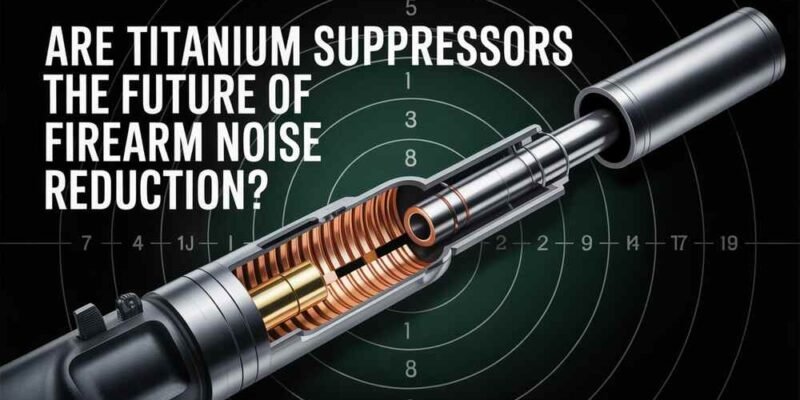Titanium suppressors are a key component in many firearm and hunting setups. They are praised for their lightweight design, durability, and ability to reduce noise, making them ideal for shooting enthusiasts, hunters, and law enforcement professionals. In this article, we will explore the advantages and challenges of titanium suppressors, their practical uses, and how to choose the right one for your needs.
The Advantages of Titanium Suppressors
Why Titanium is the Material of Choice for Suppressors
Titanium has become a popular choice for suppressor construction due to its unique blend of qualities. Titanium suppressors are lightweight yet durable, making them much easier to handle than heavier materials like steel. This is especially important for long hunting sessions or tactical operations where weight can affect the shooter’s performance.
Additionally, titanium is highly resistant to corrosion. This is a key benefit for users who often shoot in wet or humid conditions. Titanium suppressors maintain their integrity over time, unlike metals that can rust, even when exposed to moisture and rough weather.
However, the main drawback of titanium is its cost. Titanium suppressors are often more expensive than their steel counterparts, making them out of reach for casual shooters on a budget. Despite the higher price, many consider the benefits of durability and weight reduction worth the investment.
Performance Improvements for Shooters and Hunters
Titanium suppressors offer significant performance advantages for both hunters and competitive shooters. For hunters, a suppressor can reduce noise, allowing for more discreet shots that don’t disturb the surrounding wildlife. Additionally, suppressors reduce recoil, making follow-up shots more straightforward and accurate.
The benefits are just as crucial for competitive shooters. Titanium suppressors reduce muzzle rise and recoil, helping shooters maintain better control and accuracy, especially during rapid-fire sequences. This makes it easier to maintain target acquisition and improve shooting consistency.
That being said, there are some downsides. One of the most significant challenges is heat buildup. After prolonged shooting sessions, titanium suppressors can heat up, potentially affecting their performance. This can be particularly noticeable for users engaged in high-volume shooting, such as during training or at shooting ranges.
Common Problems with Titanium Suppressors
Durability Issues Under Extreme Conditions
While titanium suppressors are known for their durability, they are not indestructible. Titanium is highly resistant to corrosion, but excessive heat or misuse can still cause problems. Under extreme conditions, titanium suppressors may experience deformation or damage, mainly if used with high-powered ammunition or in rapid succession.
For example, high temperatures generated by continuous shooting can cause a titanium suppressor to warp, affecting its performance and accuracy. To prevent this, users must take breaks during extended shooting sessions and allow the suppressor to cool down.
Maintenance and Cleaning Challenges
Like all firearm accessories, titanium suppressors require regular maintenance to remain effective. After multiple shots, carbon buildup can accumulate inside the suppressor, reducing its noise reduction capabilities and affecting performance. Cleaning titanium suppressors can be tricky because it requires the right cleaning tools and solutions that won’t damage the material.
While titanium suppressors are generally easier to maintain than other materials, cleaning them regularly is still important to ensure they remain effective over time. Not keeping a titanium suppressor can lead to decreased performance and even damage the suppressor in the long run.
How Titanium Suppressors Affect Accuracy and Noise Reduction
The Impact on Sound and Recoil
One of the main reasons for using a titanium suppressor is its ability to reduce recoil and sound. Suppressors are designed to muffle the loud sound that occurs when a shot is fired, making shooting more discreet and less harmful to the shooter’s hearing. Titanium suppressors perform exceptionally well in reducing sound, so they are popular among hunters and tactical professionals.
Furthermore, suppressors also reduce recoil, the backward movement felt after firing a shot. Titanium suppressors reduce recoil more effectively than other materials, allowing shooters to stay on target and maintain accuracy for follow-up shots.
However, there are potential downsides to the suppressor’s effectiveness. For instance, while titanium suppressors reduce noise, they may not eliminate it, depending on the caliber and type of ammunition used. For those seeking an utterly silent shot, a suppressor may not be enough, and they may need to explore more specialized options.
Accuracy Enhancement in Competitive Shooting
For competitive shooters, accuracy is everything. A titanium suppressor can help shooters maintain better control of their firearm, especially during rapid shooting scenarios. The reduced recoil and muzzle rise provided by titanium suppressors help shooters maintain their position and improve accuracy.
Despite the performance boost, titanium suppressors can slightly impact handling. The added weight, even though minimal, may alter the shooter’s natural movements, especially in precision competitions where every fraction of a second counts. Shooters must weigh the benefits of recoil reduction with any potential change in handling and movement.
Choosing the Right Titanium Suppressor
How to Match a Suppressor to Your Firearm
Selecting the right titanium suppressor for your firearm is crucial for maximizing performance. Different guns have different needs, and choosing the wrong suppressor can lead to malfunctions, poor accuracy, or excessive wear on the suppressor itself. The caliber of your firearm, the shooting you plan, and the suppressor’s design all factor into the decision.
It’s essential to consult with experts or read reviews before purchasing a titanium suppressor to ensure it matches your firearm’s specifications. For instance, a suppressor designed for a .22 caliber rifle may not perform well on a .308 due to size and gas flow differences. A well-matched suppressor enhances accuracy and noise reduction while preventing unnecessary strain on the firearm.
Considerations for Optimal Use
When purchasing a titanium suppressor, ensure it is durable enough for your needs. If you plan to use your suppressor in extreme conditions, consider one explicitly designed for high-powered ammunition or rapid-fire use. Titanium suppressors may be ideal for hunters and shooters who need a lightweight, corrosion-resistant suppressor. Still, they may not be the best choice for those who frequently engage in high-volume shooting or use heavy calibers.
Conclusion
Titanium suppressors offer a range of benefits for shooters, hunters, and tactical professionals. Their lightweight design, durability, and ability to reduce noise and recoil make them attractive for those seeking improved performance and comfort. However, some drawbacks include high cost, heat buildup, and maintenance requirements.
When choosing a titanium suppressor, it’s essential to match it with the appropriate firearm and use conditions to ensure optimal performance. Whether you are a competitive shooter, a hunter, or someone who values hearing protection, titanium suppressors are a valuable tool that can enhance your shooting experience while reducing the impact of noise and recoil.
By understanding the pros, cons, and practical applications of titanium suppressors, you can make an informed decision and choose the one that best meets your needs.
Do Read: Boom With Purpose: Why Explosive Tools Still Matter in 21st Century Projects













